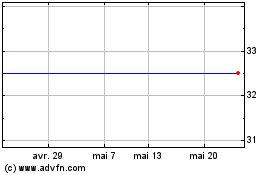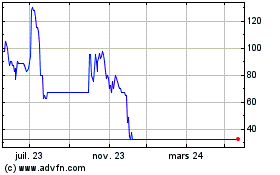UPDATE: Uganda Plans New Rules To Govern Oil and Gas Sectors
01 Janvier 2010 - 8:26AM
Dow Jones News
Uganda is in the process of formulating new legislation which
will govern the development and utilization of oil resources when
production starts in the next couple of years, the Ugandan
president said Thursday.
In his state of the nation address, President Yoweri Museveni
said that two separate pieces of legislation are being planned, one
on administration of oil and gas activities, including the
development and production of the oil and gas value chain, while
the second law will focus on regulating payments, use and
management of oil revenue in a manner that creates sustainable
national wealth.
"The key element in these legislations will be to ensure
transparency and accountability in the production and utilization
of oil resources," he said.
Oil discoveries in three blocks on the Ugandan side of the
Albertine rift are estimated at 2 billion barrels, with only around
30% of the blocks explored so far, according to government
officials. Two of the blocks are owned jointly by London-listed
Heritage Oil PLC (HOIL.LN) and UK-based Tullow Oil PLC (TLW.LN).
Tullow oil is the sole owner of one of the blocks.
Museveni further said that in order to attract the huge
investment resources required as well as the expertise in the
sector, the government will ensure that the development of oil
resources will be through the private sector, including
international companies. Where necessary, the government will
partner with some of these companies in a Public-Private
Partnership arrangement, he added.
Plans to build a medium size oil refinery aimed at meeting
domestic and regional petroleum demand are also underway. Last
week, government signed a deal with Switzerland-based Foster
Wheeler (FWLT) to conduct a six-month feasibility study on a
150,000 barrels-a-day refinery in the country.
According to Museveni, the refining of oil domestically will
help to develop the value addition chain as well as improve the
energy mix of the country.
The government is also planning to increase its expenditure from
Uganda Shillings 7.9 trillion in 2010-11 to UGX13.9 trillion in
2014/15, targeting investments in key areas of infrastructure like
roads, railway, hydropower dams, pipe line and an oil refinery, he
added.
Uganda's oil region is located around 1,300 kilometers from the
nearest port of Mombasa and lacks roads railway infrastructure.
According to President Museveni, the Ugandan economy has
continued to grow at a relatively high rate despite fears that the
global economic downturn would negatively affect the economy.
Preliminary data indicates that the economy grew 6.6% in 2009
increasing to UGX33 Trillion ($16 billion) from UGX28.2 Trillion in
2008.
-By Nicholas Bariyo, contributing to Dow Jones Newswires; +256
75-262 4615; bariyonic@yahoo.co.uk
Tintra (LSE:TNT)
Graphique Historique de l'Action
De Juin 2024 à Juil 2024

Tintra (LSE:TNT)
Graphique Historique de l'Action
De Juil 2023 à Juil 2024
